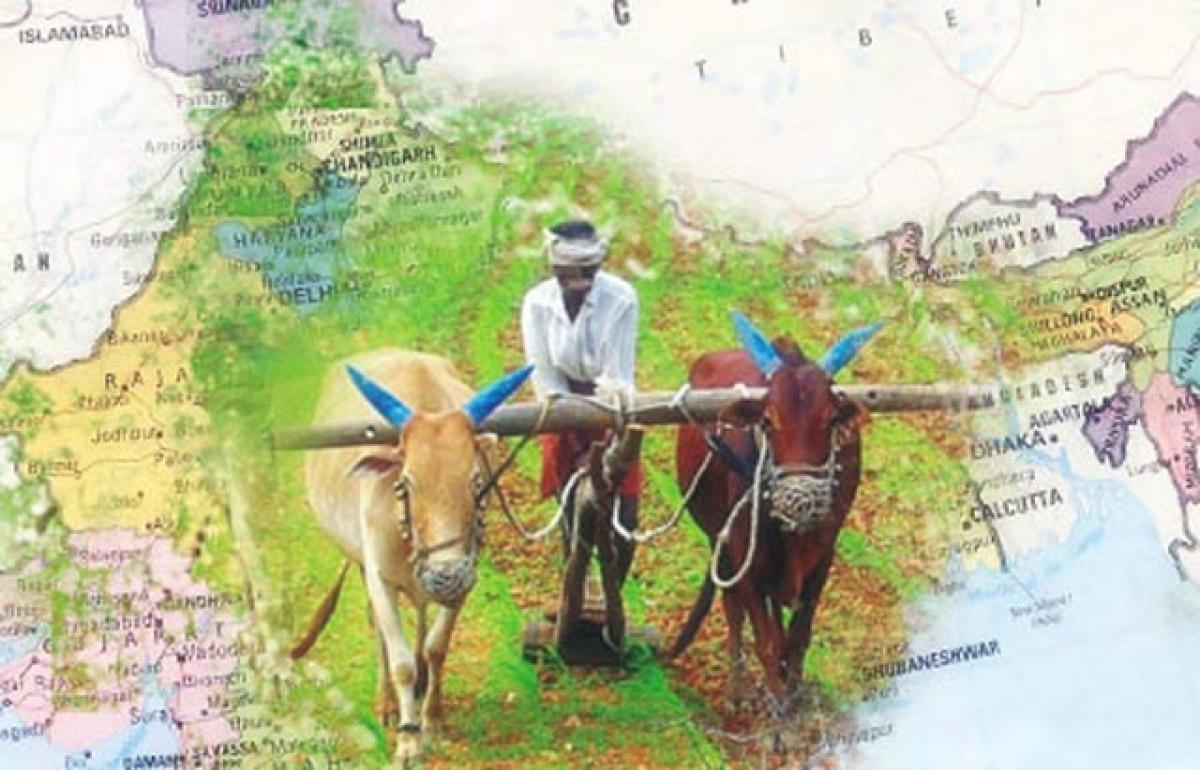Live
- Viveka’s wife questions Jagan’s move to field Avinash
- New Delhi: 88 seats in 13 states go for polling today
- YSRCP misrule will end soon in AP, says Piyush
- Hyderabad: People have no sympathy for KCR, says Revanth Reddy
- Why has BJP failed to end paper leaks in UP?
- Sonia, Rahul, Priyanka among 40 star campaigners for Congress in AP
- Ajitha gets huge welcome from people in campaign
- PM: Rajiv abolished inheritance law
- AAP brings arrest of Kejriwal into campaign song
- YSRCP Assembly nominees told to prevent cross voting
Just In

When crops are grown in rows and at high density in specific regions of soils, season after season, the replenishment part of plant nutrients is realised to be insufficient. Naturally, new chemistries were facilitated to formulate and intervene for influencing crop growth and expression.
When crops are grown in rows and at high density in specific regions of soils, season after season, the replenishment part of plant nutrients is realised to be insufficient. Naturally, new chemistries were facilitated to formulate and intervene for influencing crop growth and expression.
Subsequently, synthetic nutrients nitrogen, phosphorous, potash etc besides several minor and micro agents as artificial fertilisers entered the scene as additional inputs to natural nutrients, whose origin lies with cyclic process of life systems associated with crops.
Later, nutrient formulations that could be used through foliage or growth stimulators-cum- expression modifiers (synthetic hormones) in favour of the crop grower entered the field. When crops are grown intensively under high nutrient in-put base, the role of external organisms weeds, insects, mites, fungi, bacteria, viruses, nematodes etc associated with plants increased and necessitated to intervene. That’s how plant protection to eliminate plant competing organisms took shape and the entry of synthetic compounds started.
Thousands of synthetic chemical compounds, from copper sulphate to glyphosate are formulated to contain the pests associated with crops during the past six decades. The entry of Bacillus bacteria gene-based technologies is nothing but their continuity. Fertiliser and pesticide tread-mills, influenced by new inventions in chemistry and technology, took shape in all countries.
However, the awakening call on the role of agro-chemicals, given by Rachel Carson through her Silent Spring discourse, led to establishment of Environmental Protection Agencies in America, and several countries followed suit. The monumental works of many plant protection experts and several environmental specialists, influenced utilisation of agro chemicals.
Ultimately, the propositions and prescriptions of world bodies like FAO, ILO and WHO led to ban or restricted use of several new agro chemicals with special reference to pesticides. The Bhopal MIC gas explosion experiences and the impact cases of organochlorine and organophophate-based pesticides in India also awakened the environmentalists as well as social activists.
The in-depth studies conducted by CSE, ITRC, ICAR. ICMR, NIOH, Green peace, Pesticide Action Network Asia etc., revealed the serious repercussions of pesticides as well as synthetic plant nutrients on environment and human health. Millennium development goals also focused on sustainability of environment and protection of human health by regulating , if not abandoning, agro-chemicals.
Of course, these findings or warning calls by world bodies were neglected and in the name of food for burgeoning populations, the usage of agro chemicals increased in several countries. Interestingly, one among the pioneers of new agriculture in the world and Nobel laureate Norman Borlaug also took the negative side of agro chemicals in lighter sense. His slogan of ‘food first, environment next’ was adopted by several corporations that trade agro chemicals, on a par with those of human drugs and war-weapons.
However, the present agri crisis associated with high chemical input involvement necessitates re-look at the role of agro-chemicals. Similarly, trends to evaluate the value of food in terms of its safety i.e., devoid of pesticide residues, gained momentum. Naturally, everyone including the chemical producers and traders started talking organic or chemical less agriculture or ecological farming that is centered around environment-friendly inputs as in Cuba, Netherlands, Germany, Sweden, Switzerland and others.
Several civil society organisations started developing models of non-chemical strategies in agriculture, to reduce cost of investments and bail out farmers from crisis ridden agriculture. In response some small States like Tripura, Sikkim, Kerala etc., opted to work for it. Of late, the state of Gujarat declared its intention to start a university for organic farming. Alternatives shown by farmers themselves Indian print and electronic media recently brought forth certain areas of development in alternate agriculture.
Farmers emphatically say that more than miracle seeds or GM crops and new molecules of agro chemicals that respond spontaneously, they need full support for organic inputs that contribute to recycling process and restore complexity of the bio-system. Under such condition only, no single organism can dominate and diminish the output of crop. Many farmers are resorting to practices like usage of crop residues, manures from farm waste/urban waste, enhancing the role of multi-purposeful microbials, growing legumes in sequence cropping or mixed copping, inter-planting methods, following crop rotation, conserving macro and micro fauna that act as food links of the system.
They are preferring microbial origin or natural chemicals for interventions in addition to modern methods to regulate moisture and aeration in crop cultures. For such activity they need strong research base, monetary investments by governments, payment in proportion with real value of labor and products of their farm. (The writer is a retired professor at ANGRAU)
By N Venugopal Rao

© 2024 Hyderabad Media House Limited/The Hans India. All rights reserved. Powered by hocalwire.com







